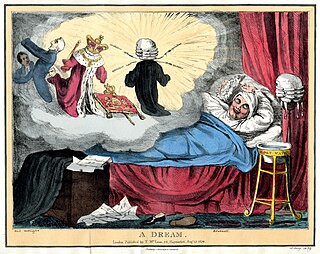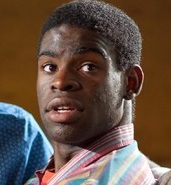In the psychology subfield of oneirology, a lucid dream is a type of dream wherein the dreamer realizes that they are dreaming during their dream. The capacity to have lucid dreams is a trainable cognitive skill. During a lucid dream, the dreamer may gain some amount of volitional control over the dream characters, narrative, or environment, although this control of dream content is not the salient feature of lucid dreaming. An important distinction is that lucid dreaming is a distinct type of dream from other types of dreams such as prelucid dreams and vivid dreams, although prelucid dreams are a precursor to lucid dreams, and lucid dreams are often accompanied with enhanced dream vividness. Lucid dreams are also distinct state from other lucid boundary sleep states such as lucid hypnagogia or lucid hypnopompia.

A dream is a succession of images, ideas, emotions, and sensations that usually occur involuntarily in the mind during certain stages of sleep. Humans spend about two hours dreaming per night, and each dream lasts around 5–20 minutes, although the dreamer may perceive the dream as being much longer than this.

Dream interpretation is the process of assigning meaning to dreams.
In psychoanalytic theory the “id, the ego and the superego” are three different, interacting agents in the psychic apparatus as Sigmund Freud summarized and defined it in his structural model of the psyche. He developed these three terms to describe the basic structure and various phenomena of mental life as they were encountered in psychoanalytic practice. Freud himself used the German terms das Es, Ich, and Über-Ich, which literally translate as "the it", "I", and "over-I". The Latin terms id, ego and superego were chosen by his original translators and have remained in use.

Dreams is a 1990 magical realist anthology film of eight vignettes written and directed by Akira Kurosawa, starring Akira Terao, Martin Scorsese, Chishū Ryū, Mieko Harada and Mitsuko Baisho. It was inspired by actual recurring dreams that Kurosawa said he had repeatedly. It was his first film in 45 years in which he was the sole author of the screenplay. An international co-production of Japan and the United States, Dreams was made five years after Ran, with assistance from George Lucas and Steven Spielberg, and funded by Warner Bros. The film was screened out of competition at the 1990 Cannes Film Festival, and has consistently received positive reviews.
Oneiromancy is a form of divination based upon dreams, and also uses dreams to predict the future. Oneirogen plants may also be used to produce or enhance dream-like states of consciousness. Occasionally, the dreamer feels as if they are transported to another time or place, and this is offered as evidence they are in fact providing divine information upon their return.
A false awakening is a vivid and convincing dream about awakening from sleep, while the dreamer in reality continues to sleep. After a false awakening, subjects often dream they are performing their daily morning routine such as showering or eating breakfast. False awakenings, mainly those in which one dreams that they have awoken from a sleep that featured dreams, take on aspects of a double dream or a dream within a dream. A classic example in fiction is the double false awakening of the protagonist in Gogol's Portrait (1835).

The Sandman: Endless Nights is a graphic novel written by Neil Gaiman as a follow-up to his Sandman series. The book is divided into seven chapters, each devoted to one of the Endless, a family of siblings who are physical manifestations of the metaphysical concepts Dream, Death, Desire, Destruction, Delirium, Despair and Destiny. It was published by DC Comics in 2003. It won the Bram Stoker Award for Best Illustrated Narrative. It is also the first comic book to ever be on the New York Times Bestseller List.
Celia Elizabeth Green is a British parapsychologist and writer on parapsychology.
A recurring dream is a dream which is experienced repeatedly over a long period. They can be pleasant or nightmarish and unique to the person and their experiences.
Charles Anthony Selby McCreery is a British psychologist, best known for his collaboration with Celia Green on work on hallucinatory states in normal people.
Anomalous experiences, such as so-called benign hallucinations, may occur in a person in a state of good mental and physical health, even in the apparent absence of a transient trigger factor such as fatigue, intoxication or sensory deprivation.
Pre-lucid dreaming is the beginning stages of inducing the lucid dreaming process. At this stage, the dreamer considers the question: "Am I asleep and dreaming?" The dreamer may or may not come to the correct conclusion. Such experiences are liable to occur to people who are deliberately cultivating lucid dreams, but may also occur spontaneously to those with no prior intention to achieve lucidity in dreams.

Dreamside is a fantasy novel by British author Graham Joyce, first published in the United Kingdom by Pan Books in 1991. It was later reprinted in the United States by Tor Books in 2000. The novel's primary themes are the power of the subconscious and the futility of attempting to escape the past.

Dream yoga or milam —the Yoga of the Dream State—is a suite of advanced tantric sadhana of the entwined Mantrayana lineages of Dzogchen. Dream yoga consists of tantric processes and techniques within the trance Bardos of Dream and Sleep Six Dharmas of Naropa. In the tradition of the tantra, the dream yoga method is usually passed on by a qualified teacher to his/her students after necessary initiation. Various Tibetan lamas are unanimous that it is more of a passing of an enlightened experience rather than any textual information.
The persona, for Swiss psychiatrist Carl Jung, is the social face the individual presented to the world—"a kind of mask, designed on the one hand to make a definite impression upon others, and on the other to conceal the true nature of the individual."
Secondary consciousness is an individual's accessibility to their history and plans. The ability allows its possessors to go beyond the limits of the remembered present of primary consciousness. Primary consciousness can be defined as simple awareness that includes perception and emotion. As such, it is ascribed to most animals. By contrast, secondary consciousness depends on and includes such features as self-reflective awareness, abstract thinking, volition and metacognition. The term was coined by Gerald Edelman.

An anxiety dream is an unpleasant dream which can be more disturbing than a nightmare. Anxiety dreams are characterized by the feelings of unease, distress, or apprehension in the dreamer upon waking. Anxiety dreams tend to occur in rapid eye movement sleep, and usual themes involve incomplete tasks, embarrassment, falling, getting in to legal or financial trouble, failed pursuits and being pursued by another, often an unrealistic entity but other human beings can also be the pursuer. Anxiety dreams may be caused by childhood trauma, or an adult dealing with conflict. Though they create anxiety in the dreamer, anxiety dreams also serve as a way for a person's ego to reset.

Vincent Elegba is a fictional character from the British Channel 4 soap opera Hollyoaks, played by John Omole. The character made his first screen appearance on 16 April 2013. Vincent is an illegal immigrant from Nigeria. He left the country to seek refuge fearing persecution because he is gay. The storyline has been described as an original by those involved. The show worked closely with LGBT charity Stonewall to portray the issue. His main scene partners have been Phoebe McQueen and George Smith. His friendship with Phoebe explored unrequited love as she pursued a relationship while Vincent fell in love with George. His subsequent detaining by immigration officials found him placed on remand and becoming the victim of homophobic violence. The character has proved unpopular with critic Anthony D. Langford from TheBacklot.com who has often deemed his relationship with George as implausible.

Deep Sleep is a series of point-and-click adventure games created by Polish indie developer Scriptwelder. The series consists of three free browser games in which the player attempts to navigate and eventually escape a dream world inhabited by shadow people. The first game, Deep Sleep, was designed for and won first place in the 2012 Jay Is Games Casual Gameplay Design Competition. Connections between Scriptwelder's Deep Sleep and Don't Escape series were hinted at throughout each, with a much deeper connection being established with the release of Don't Escape 4. Ties between these series and the fictional company Sidereal Plexus have been referred to as the "Scriptwelder Multiverse".








